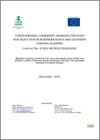Mongolia’s reindeer herders and their taiga homeland are today facing unprecedented challenges from unregulated mining, forest logging, loss of access to natural resources, tourism, and climate change. There is an urgent need to ensure that conditions are in place to maintain reindeer husbandry as a resilient and sustainable livelihood.
Year of publication: 2012Organization: United Nations Environment Programme (UNEP)
Topic: Economy, Environmental services, Indigenous peoples
Language: English
Type of document: Technical
Geographical coverage: Central Asia
This study report aims to map the grazing corridors for the Garre and Degodia clans in Wajir and Mandera Counties in Northern Kenya and Moyale, Dolo Ado, Filtu and Hudet Woredas in Southern Ethiopia, as part of the mechanism of minimizing drought risks. It presents the major problems associated with drought risk reduction strategies in the project area. The report calls for a more pro-active approach in addressing disaster risk reduction issues for the arid land inhabitants in the Horn of Africa.
Year of publication: 2011Organization: Individual authors
Topic: Climate change, Resilience
Language: English
Type of document: Technical, Maps
Geographical coverage: Eastern Africa
Access to productive rangeland has long been a critical issue affecting pastoralists in Ethiopia. This work facilitated a review of a specific set of changes to rangeland management in Ethiopia, that is, the establishment of rangeland enclosures. The review considered the development of rangeland enclosures in Ethiopia and examined how different actors perceive the likely impact of enclosures on pastoralist livelihoods. Central to the review was the need to understand impact by pastoralist wealth group. The review process involved a literature review, field assessments in Borana and Somali pastoralist areas to understand current perceptions of the benefits of enclosures, particularly for poorer pastoralists, and finally, local stakeholder review workshops.
Year of publication: 2011Organization: Feinstein International Center
Topic: Economy, Land
Language: English
Type of document: Technical
Geographical coverage: Eastern Africa
The Karamoja region of northeastern Uganda has seen a precipitous decline in access to and availability of animal milk at the household level in recent years. This change has affected livelihoods, food security, and the nature of market exchanges, but has had the greatest impact on the diets and nutrition of young children.
The objective of the study was to understand how milk had changed in the diets of children under age five and in household livelihood strategies. To that end, the project sought to understand the sources of milk coming into the household, the uses of milk within households, and the role milk played within the diets of children. The project then examined how these factors had changed over time.
The findings showed that households have seen a sharp reduction in milk from their own herds, and seek to compensate for this loss with purchased milk. Overall milk supply within households in all areas has drastically reduced due to multiple years of drought, livestock loss, and the erosion of animal-based livelihoods.
Year of publication: 2011Organization: Feinstein International Center
Topic: Food security
Language: English
Type of document: Scientific
Geographical coverage: Eastern Africa
This report, based on 21 case-studies, from 17 countries in four continents, describes how pastoralists successfully defended/asserted their land rights. The question at the outset was what elements contribute to the success of pastoralists’ securing land rights and resources. Pastoralists, due to their way of life and their traditions, are caught in a vicious cycle of marginalization, discrimination and loss of identity and confidence. Yet, the basic message of the case-studies is that success can be attained.
Year of publication: 2011Organization: International Union for Conservation of Nature (IUCN)
Topic: Land
Language: English, Français, Español
Type of document: Technical
Geographical coverage: Global
This report assesses the contribution of livestock to the Kenyan national economy. Livestock specialists frequently argue that livestock production is underrepresented in the GDP estimates of African nations. With respect to Kenya this argument is confirmed. The report provides an estimate of the pastoral livestock population in Kenya and its monetary value.
This report also comes with a policy brief.
Year of publication: 2011Organization: Institute for Research and Implementation of Development Methods (IRAM)
Topic: Economy
Language: English
Type of document: Technical
Geographical coverage: Eastern Africa
Pastoralists depend on water for sustaining herds, as well as for their own health and survival. When water availability declines, pastoralists have to move their herds elsewhere to avoid their depletion and consequent impoverishment. Water for livestock needs has received little attention from policy makers and practitioners in the water sector.
This policy brief summarizes the findings from a literature review and research in the districts of Longido and Hanang Districts in Northern Tanzania. It recognises the rationale of pastoral livelihood systems, and calls for further research and support to develop water supply, sanitation and hygiene solutions that are in harmony with such a livelihood system.
Year of publication: 2011Organization: WaterAid
Topic: Resilience
Language: English
Type of document: Technical, Policies and legislation
Geographical coverage: Eastern Africa
Au Niger, la campagne agropastorale 2009-2010, a été caractérisée par un déficit fourrager jamais égalé au niveau de toutes les régions du pays. Cette situation a entrainé en 2010 une crise pastorale sévère, face à laquelle des initiatives pour l’atténuation de ses effets ont été pensées et mises en oeuvre. En plus, de l’importance du déficit fourrager, la réaction tardive des autorités pour juguler la crise ainsi que l’installation tardive de la saison des pluies en zone pastorale, ont aggravé la situation avec des pertes énormes du capital bétail. Prenant en compte de cette douloureuse expérience l’Etat du Niger à travers le Ministère en charge de l’Elevage et ses partenaires au développement ont initié la présente étude afin de faire une évaluation rapide de l’impact de cette crise sur le monde pastoral et agropastoral. L’exercice a consisté à collecter et à analyser des informations qualitatives et quantitatives auprès des ménages sinistrés au niveau des sites retenus. Le présent document fait l’économie des principaux résultats inhérents à l’étude.
Year of publication: 2011Organization: Individual authors
Topic: Climate change, Economy, Food security
Language: Français
Type of document: Technical
Geographical coverage: West Africa









